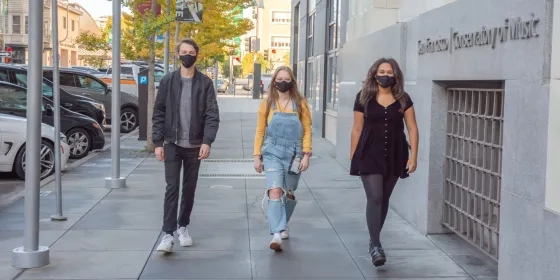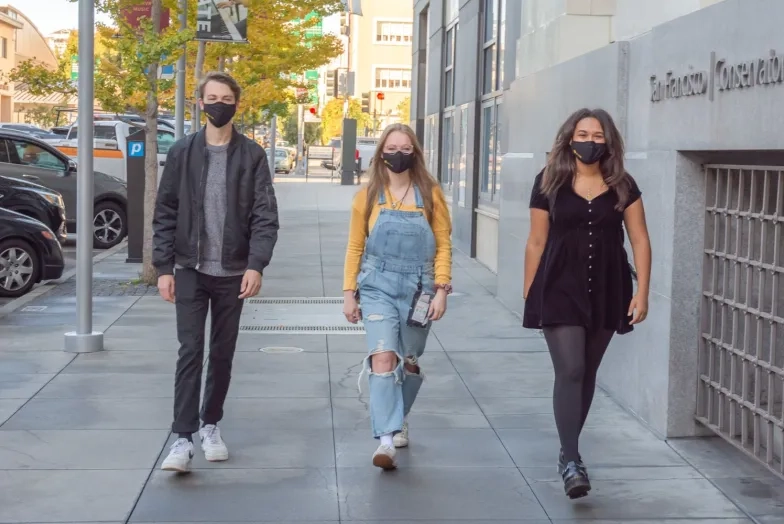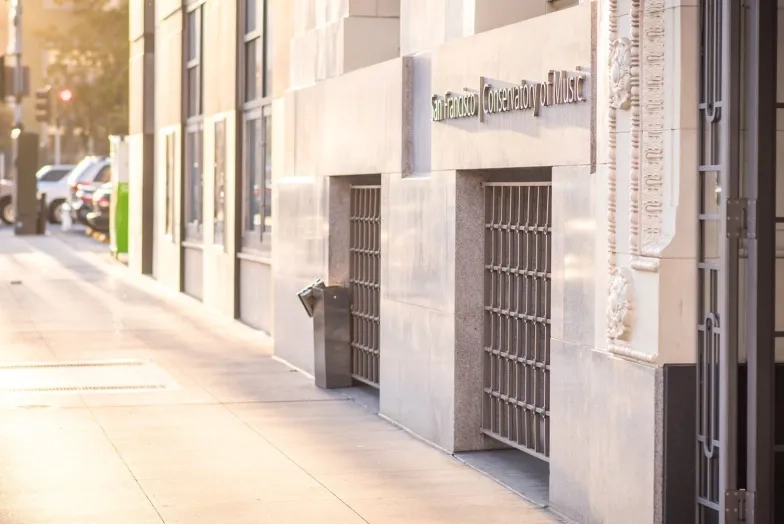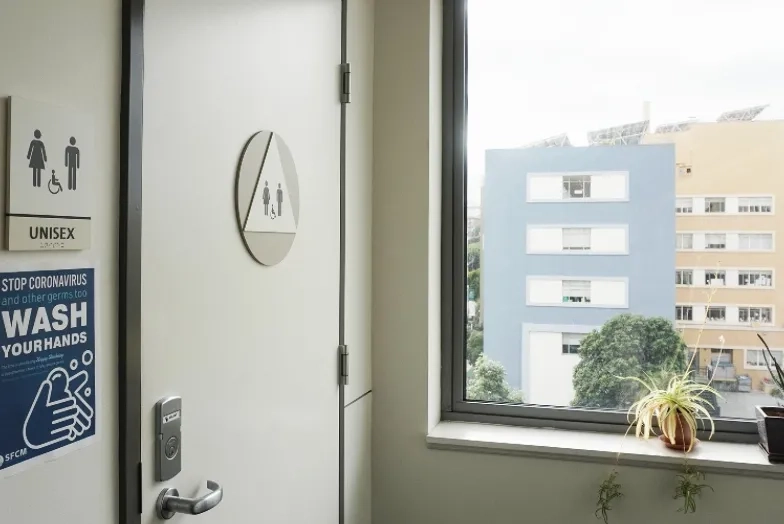How SFCM Handled COVID-19 This Past Year
In-person rehearsals and performances using the Dante Audio Networking System, over 200 free student concerts streamed online, and international partnerships are some ways the Conservatory has safely kept the music going.
By Karen Meurer Bacellar
San Francisco was the first city in the United States to issue a mandatory shelter-in-place order due to COVID-19. March 17 will mark the one-year anniversary of that order, which was one of the strictest in the nation. The city—and SFCM by extension, which has gone beyond country guidelines to prioritize wellbeing—continues to put the safety of its community first.
During these challenging times, SFCM has continued to provide students with a first-class education, consistently adapting to the (ever-changing) new normal with a creative, Bay Area spirit.
Within two weeks of lockdown, students completed department and degree recitals during Tiny Dorm Concerts, a series that ran for two months and offered students, faculty, and alumni the opportunity to perform for people worldwide from the comfort of their own living rooms. It became a precursor for the hundreds of performances streamed online in Fall 2020 (after it became clear that audiences wouldn’t be inside concert halls by then) that continue this spring semester.
To date, students have performed in over 200 virtual concerts during this school year.
All this was made possible by hours of coachings and rehearsals (in a hybrid-learning model) utilizing the Dante Audio Networking System, a tech solution pioneered by SFCM which allows ensembles and individual musicians to rehearse together, in separate rooms, with little to no audio latency.
Additionally, through a partnership with the Shanghai Conservatory, as well as SFCM faculty presence in South Korea and Taiwan, students based internationally were able to safely rehearse together in person, all while continuing academic courses and private lessons online with SFCM.
These are highlights of the many ways that SFCM has kept the music going this past year.
Below are frequently asked questions as we navigate our shared responsibility to safeguard our campus and ensure excellence in education. We wish you and your families health and prosperity as we move forward together.
What learning model is SFCM following?
Currently, SFCM is utilizing a hybrid format.
Students are given the option to study fully online, in person, or a combination of both. This enables students to switch between learning options during the school year to make sure students are in the learning environment best for them at a given time.
How has SFCM safely continued in-person instruction?
Three tools are instrumental in our ability to deliver in-person instruction:
- Dante Network System
- Installed throughout campus, the Dante system enables voice and wind students to play with others from separate rooms as if they were right next to each other, with latency-free audio networking. Woodwind and brass players are able to perform in orchestras, vocalists record operas, and RJAM students play in combos.
- Building spaces are prioritized for rehearsals and performances and were outfitted with filtration systems
- By moving academic classes online, campus spaces are being prioritized for lessons, practice, and ensembles while accommodating social distancing.
- By using an online reservation system, students are able to book practice and rehearsal spaces quickly, as well as to ensure at least 30 minutes between bookings for HEPA filtration.
- Bowes Center sound-proofing
- Because of sound-proofing in Bowes Center spaces, students are able to practice in these rooms and allow more space for off-campus students and those wanting to practice at the Conservatory’s 50 Oak Street building.
How are private lessons conducted?
Faculty provide private lessons virtually and/or in person. Faculty have been instrumental in supporting students and went above and beyond to ensure their students continued developing and learning despite the changes this year.
Have students still been performing? How?
Yes! All performances are broadcast online, in some cases reaching virtual audiences that exceed performance hall capacity limits.
- Live-streamed events began with the Tiny Dorm series, and have recently included recitals, masterclasses, and orchestra concerts, most of which have taken place on campus.
- SFCM’s performance spaces were equipped with additional high-quality cameras to allow for many performances to be broadcast with various angles, and Zoom carts are available in each space to allow for online-only students to join performance classes with on-campus students.
- In addition, each classroom and faculty space was fitted with computers, speakers, webcams, and upgraded WiFi to provide resources for students and faculty on campus to access virtual classes and lessons.
- String and piano chamber music ensemble rehearsals are held in person with ensemble members wearing facemasks and socially distanced. Faculty members are able to provide coachings in-person when permitted by the City; wind chamber music ensembles and RJAM combos are held in person using the Dante system, with each member of an ensemble in a separate space. Faculty members are able to coach also using the Dante system and in a separate space.
- SFCM invited students who have had their graduation recitals canceled in the last year due to the pandemic to return for a future opportunity to perform a recital on campus.
Do students still have access to guest artists and speakers?
Since the start of the pandemic, SFCM has welcomed guest artists from around the world virtually, such as James Ehnes, violin; Johannes Moser, cello; David Russell, guitar; Joseph Conyers, double bass; Kelly Hall-Tompkins, violin; Jean-Yves Thibaudet, piano, Patricia Racette, voice; and Spike Lee, TAC.
Some large ensemble projects have also become digital, such as a recording and performance practice projects with Edwin Outwater and other guest directors and composers, including Christopher Rountree, John Luther Adams, and The Living Earth Show.
We also streamed Commencement in May 2020 with guest speaker Alan Alda and sent graduating students a package of memorabilia.
How are auditions and prospective student trial lessons being conducted?
This year, SFCM is accepting recordings instead of in-person auditions and scheduled interviews for applicants to get to know faculty and staff better. Faculty booked more trial lessons than ever to accommodate the lack of travel.
Are SFCM students still able to gig?
The Conservatory is promoting hiring SFCM students to play or sing a personalized, virtual video performance for any occasion to make up for the reduction in in-person gigs.
Are international students able to continue their studies?
Asynchronous learning allows students outside of primary time zones in the U.S. to watch recordings of their classes on their schedules. These students also attend tutoring sessions to ensure touch points with instructors.
The Student Academic Enrichment Center is leading additional outreach to international students to build community. English language courses and exam times have been adjusted to accommodate a range of time zones.
In addition:
- A new partnership with the Shanghai Conservatory enables students in China to attend ensemble classes at Shanghai Conservatory while completing lessons and academic classes online with SFCM.
- Ensembles of students who can safely rehearse together were formed in Taiwan and South Korea.
- The Chair of String & Piano Chamber Music, as well as the Telegraph Quartet, have spent time in Taiwan and South Korea to safely work in-person with students in chamber ensembles.
What has SFCM done to implement COVID-19 testing and sanitization best practices?
The following practices were implemented to foster the health and safety of our community:
- Arrival and surveillance testing
- All students were tested for COVID-19 at the start of each semester. SFCM covered the cost of testing. Students living on campus were tested again two weeks later, and SFCM regularly tests a percent of students, faculty, and staff about every 5 weeks as part of surveillance testing.
- Requests for COVID-19 tests from all SFCM employees and students are accommodated.
- Students are encouraged to make use of the OneMedical membership provided by SFCM to video chat with health professionals about any health concerns. They can also request a COVID-19 test through OneMedical.
- Symptom tracking
- All members of the SFCM community are required to track symptoms daily in the Everbridge app in order to leave on-campus housing and to enter campus buildings. Both SFCM campus buildings have only one entry point, allowing security to check for the symptom tracking confirmation.
- Building sanitation
- All hard surfaces, including piano keys, door handles, computers, and tables are sanitized nightly.
- Hand sanitizer and wipes that kill COVID19, H1N1, HBV, HCV, HIV-1, and other diseases are provided throughout common building spaces. Hand sanitizer dispensers were installed in most rooms.
- Air purifiers were added in every classroom, practice room, studio, and office. Ventilation was increased in performance spaces. (Please refer to our fall Health Update for more details on ventilation.)
In addition, administrators who can complete work from home remain at home.
What financial and health support has SFCM provided during the pandemic?
Here’s a list of efforts to support financial aid and wellbeing for SFCM students:
- SFCM provided a 10% COVID-19 related reduction in billable Fall 2020 tuition
- Students who moved out of on-campus housing for the spring semester were given a refund.
- SFCM offers housing refunds, when appropriate, which includes providing a 10% COVID-19 related reduction in billable Fall 2020 tuition.
- A dedicated fund for purchasing equipment helped students purchase microphones and other needed equipment for online learning through the Professional Development and Engagement Center’s Professional Development Grant.
- SFCM purchased and lent new keyboards to students in the Bay Area.
- SFCM disbursed the $124,508.00 given to us in CARES Act funding to domestic students who applied for the emergency grants, and a separate fund for emergency grants and other financial support of $126,113 was created for international students who did not qualify for the CARES Act.
- Graduate assistants and other office positions continue to be paid the estimated payments they would have received, despite less work, due to the quick move to online learning in Spring 2020.
- Online student work positions were created, such as Zoom Teaching Assistants, which also helped faculty focus on teaching rather than navigating the technology.
- Free, online yoga was established.
- Various health-related webinars and classes for students are being offered.
- Student clubs and activities continue meeting online and planning socially distanced park meet-ups for students in the same shelter-in-place "bubbles.”
- Residential Advisors lead outdoor picnics, urban hikes, and visits to farmer's markets for students in the same shelter-in-place "bubbles.”
How is on-campus housing working this year?
Students were enabled to stay on campus, even during the Spring 2020 semester, due to our ability to maintain social distancing and follow the San Francisco Department of Public Health guidelines.
Non-communal bathrooms and individual suites especially helped make this possible -- students who live on-campus were assigned one per bedroom largely thanks to lower occupancy rate because of students studying at home. Summer housing was available to any student unable to travel home. At the beginning of the semester, students were given the option to adjust their housing assignments to create “bubbles,” especially with other ensemble members.
In addition, the housing deposit and winter break fees were waived, and adjustments to meal plans and housing costs were made to accommodate students whose arrival on campus was affected by visa or other delays.
How has the city of San Francisco responded to the pandemic?
San Francisco was the first city in the U.S. to go into shelter-in-place and has continued to be cautious. Indoor dining and non-essential businesses remained closed even when cases continued to be at their lowest and restrictions were lifted in other cities.
Students in San Francisco are able to take advantage of the many parks and beaches where it is easy to social distance and get fresh air.
SFCM’s quick and consistent responses to the latest guidelines have allowed students to continue learning, making music, and progressing as artists. While the times are unprecedented, these swift actions are indicative of SFCM’s innovative culture—one that teaches budding musicians the importance of business; offers them an exceptional place to live, work, and perform in the new Bowes Center; and will give them a revolutionary connection to a top tier management company through the acquisition of Opus 3 Artists. This vibrant culture existed before the pandemic and will live on stronger in brighter times to come.
View the performance calendar for upcoming concerts and events.



